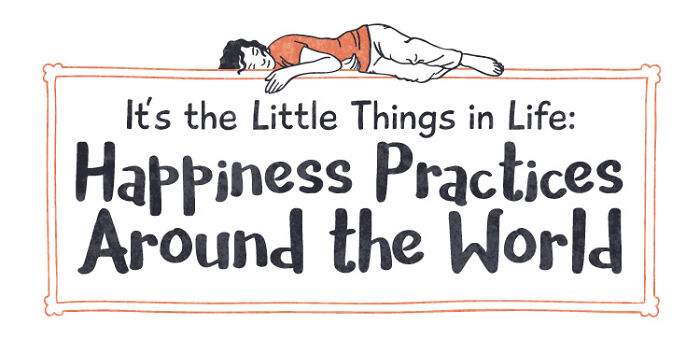What is happiness? Probably, each person who attempts to answer this question will come up with their own unique response, as happiness, in a certain sense, is something individual, personal, and inimitable. On the other hand, there is a common idea of happiness that is shared by the vast majority of people: happiness is having good health, love, sufficient wealth, and so on.
Did you know that all over the world, there are ways to 'practice happiness'? NeoMam Studios has undertaken a project called 'It’s the Little Things in Life: Happiness Practices Around the World,' which explores what 10 different countries do to find happiness.
More info: neomam.com | Instagram | twitter.com | cashnetusa.com

Image credits: CashNetUSA
This post may include affiliate links.
Japan
It may sound like an ancient rite, but Japanese forest-bathing was first developed as a scientifically verified aid to conventional medicine in the 1980s. Take yourself for a mindful walk through the woods when you feel low and you can rejuvenate mind, body and soul.
I think you can also experience a similar feeling through meditating to forest soundtracks while holding a potted ppant or simmilar, or going to a park. Not all of us have the opportunity to live so close to a forest. I feel blessed to have this opportunity now whenever I want, living just 15km away from the nearest, dense mountain forest, but that hasn't always been the case, being born in a metropolis.
Bored Panda reached out to Taylor Tomita from NeoMam Studios to gather more information about this project. We were curious to learn about the inspiration behind the project, which focuses on happiness practices around the world and highlights the small moments in daily life. Tomita explained: “Since 2004, CashNetUSA has been dedicated to providing lines of credit to help hardworking people save the day when surprise expenses arise. The CashNetUSA team runs SavingSpot, a blog where they offer expert personal finance tips to help their readers get ahead. This project was part of a campaign where we were looking for things people could do to improve their lives without spending money.”
Nigeria
The word ubuntu is taken from the Zulu phrase ‘Umuntu ngumuntu ngabantu’, which is the idea that a person only exists and thrives through community. If you are open and affirming to your neighbours, you can acknowledge your part in society and strengthen yourself by strengthening others.
Norway
Norwegians define themselves by their connection to the natural world and outdoors living. The winter is so dark that they have to roam a little to keep their spirits up, and summer days last so long that there’s always time to visit nature. Putting some time aside each day to walk in the park or really listen to a nearby river can help you find your place in the world.
We were wondering if, in their research and creative process, the authors of the project came across any particularly unique or unexpected ways people find happiness in different cultures. Taylor shared with us: “When we started our research, we found many concepts that were similar across cultures or perhaps more well-known to the vast majority of people. The 10 'little things' we ended up choosing to illustrate were the most unique and unexpected of the bunch.”
Germany
When you picture a group of Germans sitting around laughing and toasting frothy beer with each other, that’s gemütlichkeit. Difficult to directly translate, it describes a very special kind of social bonding where being playful and lively can create a sense of belonging. You can create this feeling with your family or friends by treating each meeting as an occasion and always taking an opportunity to dance or sing together.
A cup of tea, a good book, and my dog on my lap give me that same feeling. 🥰
France: ‘Aperitif’
The French like to take a petit drink to mark the end of work and the beginning of the evening, and what ritual could be more civilized than a polite appetizer? Try something French like a glass of pastis or vermouth when you get in from work to put you in the mood for dining.
Next, we wanted to know Taylor’s opinion on how incorporating these simple joys into daily routines can improve the quality of life for individuals. We learned that: “Many of these 'little things' people can do come with noticing and appreciating their surroundings as well as connecting with those they love. Both of those have been found to lead to greater happiness and improved mental health. Take Norway's friluftsliv as an example (the concept of spending time in nature); research shows that spending time in nature is linked to both cognitive benefits and improvements in mood, mental health, and emotional well-being.”
Spain
The famous Spanish afternoon nap has been around for thousands of years and, if it used to be considered a physical necessity, today it is often regarded to be a luxury. Even if you don’t live in a hot climate, a 20-minute nap after lunch can help avoid that energy dip that derails so many good starts.
I am useless between 2-3 pm. Just nodding off. So this is a wonderful practice
Turkey
If keyif is a central part of Turkish national culture it is also, in practice, a very personal thing. Keyif means just finding a moment to be by yourself and to quietly live in the moment. You can choose to do so on the beach, on a park bench or in the bath.
Lastly, we asked Taylor how NeoMam Studios hopes this series inspires people to appreciate and incorporate more moments of happiness into their own lives, and we were told that: “In a world where everything seems to come with a price tag, we hope this series will help those who are going through a difficult time finding one thing they can do right now to help them brighten up their day without the need to spend money.”
Bosnia And Herzegovina
The tempo in Bosnia is somewhat slower than elsewhere in Europe, and kafa – the coffee break – is a big part of that. Sitting down with this specially prepared brew means committing to a discussion of world affairs and personal gossip, and forgetting about time for a few moments to concentrate on the flavor of the coffee and on the quality of your company.
Argentina, Uruguay, Paraguay, Brazil
“Yerba mate raises morale,” wrote the French Society of Hygiene in 1909, “sustains the muscular system, augments strength and allows one to endure privations. In a word, it is a valiant aid.” This miraculous tree leaf tea can be taken alone as part of your morning ritual or sipped from a calabashbowl and passed around with friends.
I did a student exchange in Argentina and got to discover the joys of mate. I still have my mate gourd and my bombilla (steal straw).
Russia
A familiar practice that is fun to see through the eyes of a foreigner. In a small, very hot room, you find boiling water and ice water. This is a place where people communicate heart to heart, not forgetting to whip each other with brooms made from branches and leaves of different trees.
I need these right now but instead I'm doing the tradition called, in my language, "classwork, procrastination, and pretending to be happy and productive"
The Dutch people also use 'uitwaaien' as a way to let lose any feelings of being stuck inside by going outside for movement.
Especially nice on the beach on a windy day.
Load More Replies...I need these right now but instead I'm doing the tradition called, in my language, "classwork, procrastination, and pretending to be happy and productive"
The Dutch people also use 'uitwaaien' as a way to let lose any feelings of being stuck inside by going outside for movement.
Especially nice on the beach on a windy day.
Load More Replies...
 Dark Mode
Dark Mode 

 No fees, cancel anytime
No fees, cancel anytime 




































































